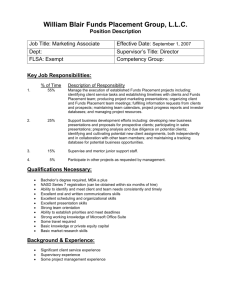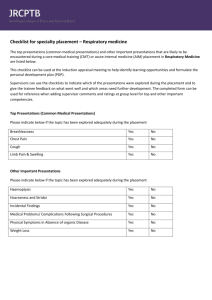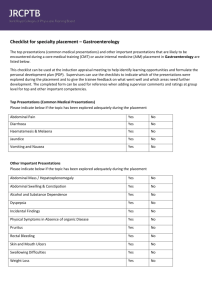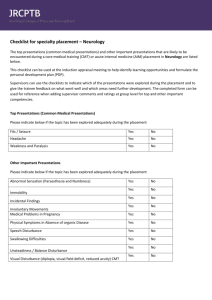Community Psychology Internship Syllabus (Maurice Elias, 2007)
advertisement
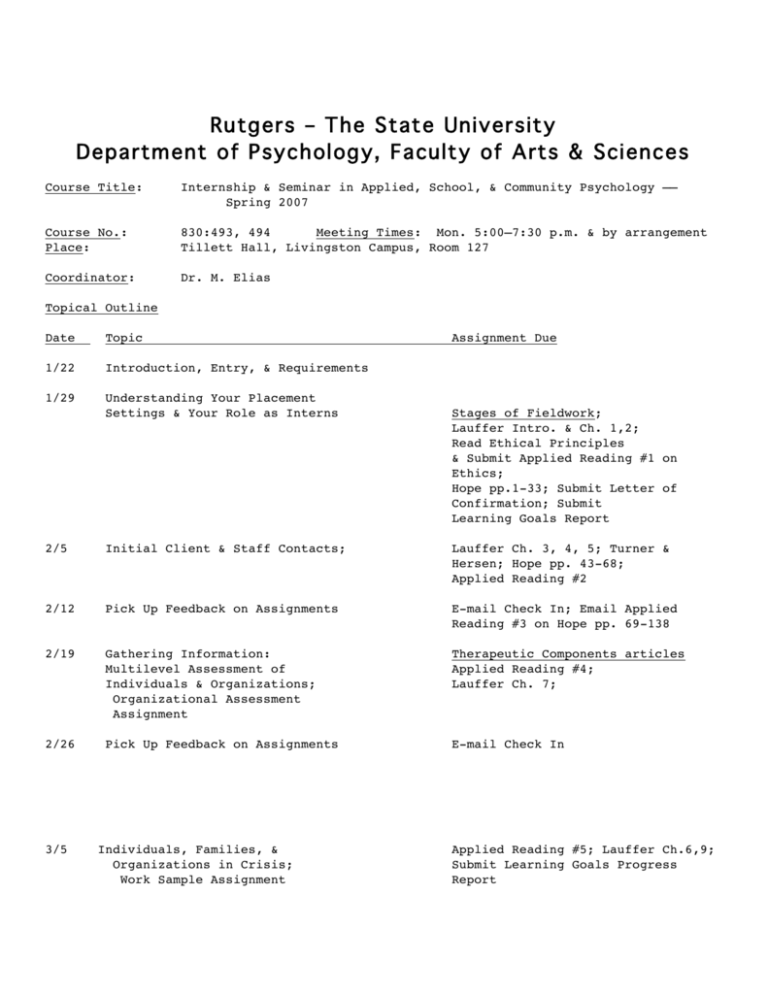
Rutg ers – T he Stat e Univ ersit y Departm ent of Psycholog y, Facult y of Arts & Sciences Course Title: Internship & Seminar in Applied, School, & Community Psychology –– Spring 2007 Course No.: Place: 830:493, 494 Meeting Times: Mon. 5:00–7:30 p.m. & by arrangement Tillett Hall, Livingston Campus, Room 127 Coordinator: Dr. M. Elias Topical Outline Date Topic 1/22 Introduction, Entry, & Requirements 1/29 Understanding Your Placement Settings & Your Role as Interns Assignment Due Stages of Fieldwork; Lauffer Intro. & Ch. 1,2; Read Ethical Principles & Submit Applied Reading #1 on Ethics; Hope pp.1-33; Submit Letter of Confirmation; Submit Learning Goals Report 2/5 Initial Client & Staff Contacts; Lauffer Ch. 3, 4, 5; Turner & Hersen; Hope pp. 43-68; Applied Reading #2 2/12 Pick Up Feedback on Assignments E-mail Check In; Email Applied Reading #3 on Hope pp. 69-138 2/19 Gathering Information: Multilevel Assessment of Individuals & Organizations; Organizational Assessment Assignment Therapeutic Components articles Applied Reading #4; Lauffer Ch. 7; 2/26 Pick Up Feedback on Assignments E-mail Check In 3/5 Individuals, Families, & Organizations in Crisis; Work Sample Assignment Applied Reading #5; Lauffer Ch.6,9; Submit Learning Goals Progress Report 3/19 Preparation for Presentations Submit Organizational Assessment; Have Supervisors Complete Evaluations; Submit Self–Evaluation 3/26 Creating Change in Persons & Settings Initial Student Presentations Crossover Assignment 4/2 No class- Passover Observance Email Check In 4/9 Student Presentations Learning Goals Progress Report 4/16 Student Presentations; Preparation for Completion in Settings Endings and Transitions 4/23 Student Presentations Reread Stages of Fieldwork Course Evaluation 4/30 Completion Submit Summary Reflections; Submit Supervisor & Self Evaluation Forms; Obtain Letter of Completion; Submit Crossover Readings and Interview Summary NOTE: Any course work turned into the instructor's INTERNSHIP mail box (in the departmental office) MUST be initialed and dated by one of the departmental secretaries in Tillett Hall, Livingston Campus. Staff office hours are 8:30–4:30, closed 12-1 for lunch. Academic Expectations: 1.Seminar Performance: Students are expected to attend all scheduled seminars at the University. If you cannot attend, you must call in advance, as well as follow up on what was missed by getting notes from a classmate. Students are expected to come to class having reviewed their written journals, completed the assigned readings, and prepared to hand in written assignments. It is expected that students will ask questions of each other and the Coordinator and share their experiences at their placement settings. Presentation of one's work sample and reactions to others' presentations will be particularly important. % of course grade = 25% 2.Placement Performance: Students will be evaluated by their on–site supervisors twice during the semester. The Final Evaluation Form (with students' comments), students' self–evaluation of performance at the setting and of progress made on learning goals, and input to me from staff at the placement setting will comprise criteria for measuring placement performances. % of course grade = 60% 3.Summary Paper: This paper will integrate areas, including (a) academic knowledge; personal & professional competence. The of the setting & the relationship of the % of course grade = 15% students' experiences and growth in several (b) application of techniques; and (c) paper should also reflect one's understanding setting to the wider community. Required Text: 1.Lauffer, A. & Associates. (1984). Understanding your social agency (2nd ed.). Beverly Hills, CA: SAGE. 2.Brendtro, L., Brokenleg, M., & Van Bockern, S. (2002). Reclaiming youth at risk: hope for the future (Rev.Ed.). Bloomington, IN: National Education Service. Our Required Reading: 1.Frank, J. (1982). Therapeutic components shared by all psychotherapies. In J.H. Harvey & M.M. Parks (Eds.), Psychotherapy research and behavior change. Washington, DC: American Psychological Association. 2.Suelzle, M., & Borzak, L. (1981). Stages of fieldwork. study. Beverly Hills, CA.: SAGE. In L. Borzak (Ed.), Field 3.Ethical Principles of Psychologists (2003 revision). 4.Shulman, L. (1984). and groups. Endings & transitions. Chapter 5 in Skills of helping individuals 5.Other readings and web readings, as determined by interest, placement setting, and availability.
